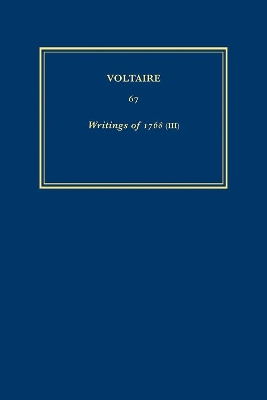Even by the hyperactive standards of Voltaire, 1768 was to prove a remarkable year and this volume is distinguished by a multiplicity of works. His interest in eastern Europe manifested itself in the "Discours aux confederes catholiques", he was anxious to smooth over matters concerning the alleged thefts of manuscripts by La Harpe through the "Declaration", and was delighted when a ship was named after him, publicising the event by composing the "Epitre a mon vaisseau". His playful practice of attributing his works to pseudonymous authors was joyously continued ("Instruction du gardien des capucins de Raguse", "Lettre de l'archeveque de Cantorbery"), and revenge was enacted on the author of the "Compere Matthieu", a work attributed to Voltaire in 1766. The reverberations of the Belisaire affair of 1767 are reflected in a number of texts: the "Declaration", the "Lettre de l'archeveque de Cantorbery", "La Prophetie de la Sorbonne", "Les Trois empereurs en Sorbonne", "Le Sermon preche a Bale" and the "Epitre ecrite de Constantinople". Personal scores are settled with La Bletterie and with a new target in "Le Pyrrhonisme de l'histoire", Chiniac de la Bastide; the basis of the authority of Rome and the Scriptures is characteristically undermined in "Les Droits des hommes", the "Epitre ecrite de Constantinople" and the "Instruction du gardien des capucins de Raguse"; and the doctrines of Christianity are likewise ridiculed in the scathing dialogue of the "Relation du bannissement des Jesuites de la Chine". In some respects, however, 1768 can be regarded as a year of relative optimism, with Voltaire's belief, perhaps, that the philosophic cause was gaining ground.
- ISBN10 0729409007
- ISBN13 9780729409001
- Publish Date 25 September 2007
- Publish Status Active
- Publish Country GB
- Imprint Voltaire Foundation
- Edition Critical edition
- Format Hardcover
- Pages 451
- Language French
- URL http://voltaire.ox.ac.uk/book/writings-1768-iii
